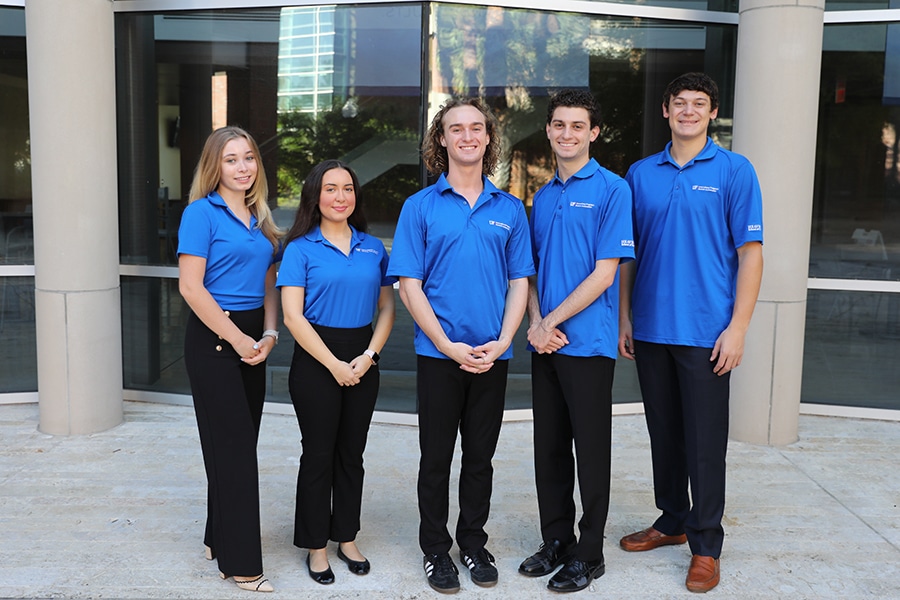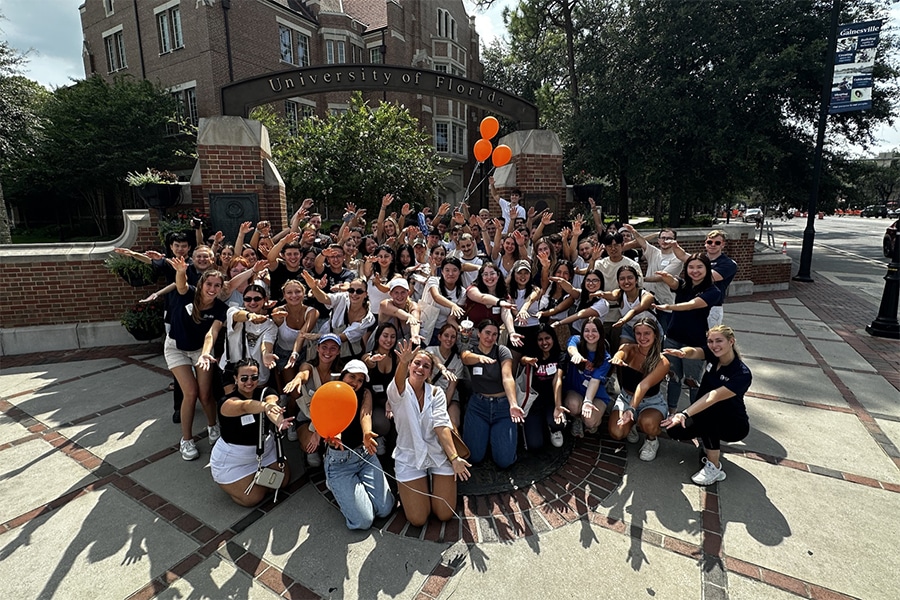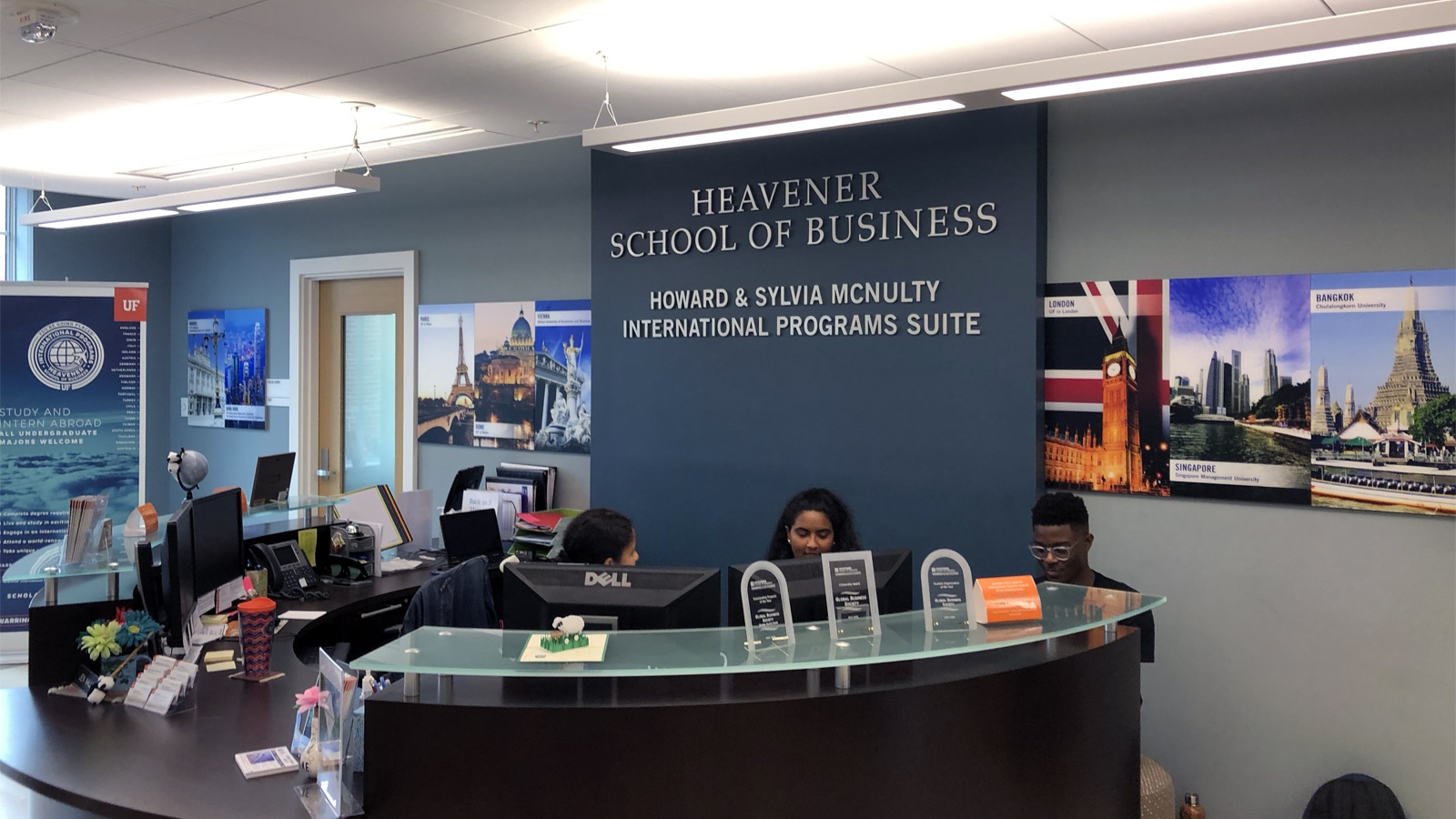
Heavener international study abroad and exchange programs
Explore the world and shape your future
As business shifts to an interconnected, global economy, the University of Florida Warrington College of Business opens the door and encourages you to explore it for a first-hand, personalized perspective you’ll take with you into the workplace.
Let your knowledge and interests steer your journey: Point your compass overseas for one of our study abroad programs, or come to Warrington as an exchange student to learn business at one of the country’s top schools.
No matter your interest, there are options for international study at your fingertips. From structured programs to international internships, the college’s Heavener International Programs have affordable options for every student. A global business mindset isn’t just nice to have — it’s essential and a differentiator for your résumé.
Why study abroad?
Each country has its own business dialect. Study abroad trips sharpen your fluency to help you strike up lasting connections with co-workers, contractors, clients, and customers in different time zones and markets.
A global perspective of business
Context is everything in business. Studying abroad — in a new city, with new classmates — shows you just how variable many theories and concepts can be.
Challenge yourself
In your career, you’ll encounter many problems without a clear solution. Navigating a new country requires you to adapt quickly, find opportunity among ambiguity, and remain unfettered in unfamiliar situations.
Keep building your resume, network, and visibility
From classrooms to corporate offices, every new face becomes a potential connection. Likewise, all new experiences become prime and more personal talking points for job interviews and as an ambassador around campus.
Career readiness
Experience puts your knowledge into perspective, lengthens your résumé, and ignites your career. For these reasons, Warrington requires all on-campus BSBA and BABA students to complete an internship or study abroad trip. Roughly half of all students spend some time overseas.
Which program is right for me?
Business students have the option of studying abroad on a Heavener study abroad or exchange program.
Benefits
- Offered in 7 different countries
- Live and study with other UF students
- Courses taught in English
- Language, culture, and business courses offered through international partners
- Take select online UF business courses
- Internships available in London and Dublin.
- Package program (activities, transport, housing)
- More affordable than comparable programs
- Offered Fall, Spring, and Summer semesters
Eligibility
- Students must have a minimum 2.5 UF GPA and be in good standing.
- Students must have completed two full semesters at UF by program start.
- Students should avoid studying abroad in their final semester.
- By the application deadline, students must have a passport that is valid through at least six months after program end date.
- All majors considered (preference for business majors).
Benefits
- Placements at 27 partner universities across the world
- Independent experience – live with other exchange students or local students
- Courses taught in English
- Take required coursework at international universities
- Enhance your major with discipline-specific courses that may not be offered at UF
- Get involved in a variety of student groups and activities
- Support services are primarily provided through the host university
- Typically the least expensive type of study abroad program for in-state students
- Available Fall and Spring semesters
Eligibility
- Students must have a minimum 3.0 UF GPA and be in good standing.
- Students must have completed two full semesters at UF by program start.
- Students should avoid studying abroad in their final semester.
- By the application deadline, students must have a passport that is valid through at least six months after program end date.
- All majors are eligible, but business students receive priority.
Applying for an international program
Step 1: Start the online application through your desired program’s page.
Step 2: Researched your program and meet with an International Programs Student Ambassador or attend an info session.
Step 3: Submit a color scan copy of your passport to the International Programs Passport Portal.
- Passport must be signed, and expiration date must be valid at least 6 months after the program end date.
Step 4: Meet with a Heavener Study Abroad advisor to complete your Academic Advising Form.
- Review course offerings prior to meeting with an International Programs academic advisor.
- If you’re interested in exchange programs, please review the Heavener Course Equivalencies Database for approved courses related to your desired program.
- Call the International Programs Office at 352-273-0151 to book an advising appointment.
Step 5: Complete the online application by submitting the following:
- Submit your Academic Advising Form via UFIC’s Contact Form.
- Pay the non-refundable deposit via the online application.
- Submitting deposit does not guarantee program placement. Applications are processed on a rolling basis. Spots are first come first served to students with completed applications. Programs may close early, if capacity is reached.

Heavener study abroad programs
Immerse yourself in business and culture through custom study abroad experiences. Combining coursework, professional development, and cultural excursions, you’ll gain valuable skills, connections, and insight with fellow business students across Europe and Asia.

UF in Dublin
Offered Fall, Spring and Summer.
Internship guaranteed.

UF in Europe
Offered in Fall.

UF in London
Offered Fall, Spring and Summer.
Internship guaranteed.

UF in Japan
Offered in Summer B.
Business Case Consulting Experience.

UF in Madrid
Offered Fall, Spring and Summer.

UF in Madrid – Emerging Leadership
Offered in Spring.
Includes spring break study abroad trip.

UF in Paris
Offered in Spring and Summer.

UF in Rome
Offered in Spring and Summer.

UF in South Korea
Offered in Summer A.
Internship guaranteed.
Exchange programs
You’ll study abroad while paying UF tuition, earning credit toward your degree, and experiencing life as a student in another country. You can choose from a network of prestigious partner universities around the world to gain global experience.
Aalto University – Helsinki, Finland
Aarhus BSS – Aarhus, Denmark
Aston Business School – Birmingham, England
BI Norwegian Business School – Oslo, Norway
Bocconi University – Milan, Italy
Carlos III de Madrid – Madrid, Spain
Católica Lisbon – Lisbon, Portugal
Chulalongkorn University – Bangkok, Thailand
ESCI – Universitat Pompeu Fabra – Barcelona, Spain
Grenoble Ecole de Management – Grenoble, France
Hochschule Osnabrück – Osnabrück, Germany
Korea University Business School – Seoul, South Korea
National Chengchi University – Taipei, Taiwan, Republic of China
Sabanci University – Istanbul, Turkey
Singapore Management University – Bras Basah.Bugis District
SKEMA Business School – Sophia Antipolis, France
Universidad Adolfo Ibanez – Viña del Mar & Santiago, Chile
Universidad de Navarra – Pamplona, Spain
Universidad del Pacifico – Lima, Peru
Universiteit Maastricht – Maastricht, Netherlands
University of Manchester – Manchester, England
University of New South Wales – Sydney, Australia
WHU – Otto Beisheim School of Management – Vallendar, Germany (near Koblenz)
WU – Vienna University of Economics and Business – Vienna, Austria
Yonsei University – Seoul, Korea
International internships
Put your business skills into practice in an international setting. Our internship opportunities in cities like Dublin, London, and Seoul give you hands-on work experience, professional connections, and a competitive edge in the global job market.
Affiliate internship opportunities
Non-affiliate/independent internships
All credit associated with international travel must be approved by the University of Florida International Center.
- Obtain an “Employer Verification Letter” from the prospective company with the dates of the internship, expected work hours, anticipated responsibilities, and supervisor contact info (email, phone, address) on the company letterhead.
- Submit the Independent International Internship Request Form. The Heavener International Programs Office will reply with the approved Academic Advising Form.
- Sign and date your Academic Advising Form and submit via UFIC’s Contact Form. UFIC will set up your online application.
- Complete the UFIC online application and pay the application fee.
- Apply for the GEB 4941 Internship Course after your UFIC application is approved.
Incoming exchange students
Welcome to Gainesville! Heavener International Programs provides incoming exchange students with the resources, advising, and support needed to thrive at the University of Florida’s Warrington College of Business.
Please consult the following links to learn more about the University of Florida and the Business Exchange program in the Heavener School of Business.
You may apply for the exchange program if you attend a business partner school and receive a nomination from your home university. The international office at the home university should send nominations directly through the UF International Center.
Nominated students should complete the online UFIC exchange application by the posted deadlines. Course registration cannot begin until all application documents have been submitted and all university holds have been removed.
Courses offered
- Contact your international academic advisor to review the courses you should take.
- Business course syllabi
- Schedule of Courses (all UF courses)
This page contains all courses offered by the University of Florida, many of which may not be available to undergraduate business students. Specific course schedules for incoming exchange students are released in April (Fall semester) and October (Spring semester).
Business core courses – Electronic Platform
All undergraduate exchange business students should plan on taking at least one of the business core courses. These courses are taught via Electronic Platform, which allows students to attend lectures and view past lectures online.
Credit hours
Undergraduate exchange students must take a minimum of 12 credit hours and can take up to 18 credit hours. The average course load at UF is 12-16 credit hours. Credit hours represent the amount of hours spent in class each week. Students should expect to spend an average of 1-2 hours outside the classroom for every credit hour enrolled.
Recommended Undergraduate Student Schedule
- 4 credits: Core course
- 4 credits: Business elective #1
- 4 credits: Business elective #2
- 3 credits: Elective taught by other UF colleges
Exchange students are not able to register themselves for courses which have a pre-requisite. To be registered, students must complete all application requirements and submit an online course request form. Students are encouraged to submit their course request and complete application requirements as early as possible so they can get their top choices.
Please review the course registration instructions.
Course eligibility
Exchange students from business partner schools have access to all business courses, but seats are not guaranteed in any courses. Pre-requisites are enforced for some courses but not for all. Exchange students from non-business partner schools may enroll in business elective courses at the start of the semester if space is available. Due to space restrictions, seats may not be available in many business courses at this time.
How to request business courses at UF
Business exchange students and exchange students wishing to take business courses should complete the online business course request form as early as possible so the college can reserve seats accordingly.
Add/drop period
Students can modify their schedule during the first week of classes. This provides students with the opportunity to meet the instructor and review the syllabus. Although classes can be added through the end of the first week, many classes will not have seats available at this time.
Courses at the University of Florida fill up quickly, so students are encouraged to complete course registration requirements as early as possible. The Heavener International Programs office will register exchange students for courses in the order applications are completed and send each exchange student a tentative course schedule prior to the start of term. Please pay close attention to the course registration requirements, as one hold will prevent registration.
Course registration requirements:
- Submit Online Course Request Form.
- Find business course availability and syllabi on our website.
- Submit all required immunization and insurance documents
- Course registration cannot begin until all immunization and insurance holds are cleared. Submit these forms as soon as possible and ensure documentation conforms to the guidelines. Email Health Compliance at the UF Student Health Care Center or call (352) 294-2925 for questions about insurance or immunizations. Students will not be contacted if forms are completed incorrectly.
- Create GatorLink account.
- Create a GatorLink account through the UF Computing Help Desk.
- Students must enter their UFID, your last (family) name, and your date of birth. In the U.S. always list month (mm) before day (dd).
- Contact the UF Computing Help Desk or call (352) 392-HELP to resolve any issue.
- Complete emergency contact information.
- The emergency contact information can be updated via One.UF.
- Navigate to “Student Self Service”.
- On the left menu under “My Record,” select “Update Emergency Contact Info”.
- Login with the GatorLink credentials
- Complete the emergency contact information form and submit.
- Complete local address information.
- The local address information can be updated via One.UF.
- Navigate to “Student Self Service”.
- On the left menu under “My Record,” select “Holds”.
- Login with the GatorLink credentials
- Submit local home data using address line 3 (country, city, state & zip code).
- Complete registration acknowledgement.
- The registration acknowledgement can be updated via One.UF.
- Navigate to “Student Self Service”.
- On the left menu, select “Registration Preparation”.
- Login with the GatorLink credentials.
- Follow the instructions to complete the form and submit.
- Complete mandatory health insurance acknowledgement.
By completing this step, you are acknowledging that you will be automatically registered and financially responsible for a UF insurance policy if you have not provided evidence of another accepted policy by a certain date.- The acknowledgement can be updated via One.UF.
- Navigate to “Student Self Service”.
- On the left menu under “My Record,” click “Holds”.
- Select the “Health Insurance Acknowledgement” hold.
- Login with the GatorLink credentials.
- Carefully read the policies and confirm your understanding of them.
- Check your holds.
Mandatory Business Orientations
Students should arrive a few days before the term begins to finalize housing, take care of technology and administrative needs, become familiar with the UF campus, and attend mandatory orientations. Students are required to check in with the UF International Center as soon as they arrive in Gainesville so visa requirements can be verified. Students should verify housing check-in dates with their housing provider.
Students taking business courses at UF are required to attend both the Warrington orientation and the UF International Center Orientation. Please refer to the UF International Center website and communications for specific dates and times for the UFIC Orientation.
Note: Students who don’t attend both orientations will be withdrawn from their academic courses unless other arrangements have been made in advance. If special circumstances prevent attendance at the mandatory orientations, students should seek permission for late arrival from the College of Business. Students may be permitted to arrive after the orientation in certain instances. Students will not be allowed to arrive after the first week of classes under any circumstances.
Global Gathering
In the third week of each semester, the College holds an event to welcome incoming exchange students. Students introduce themselves and their home universities to UF students and enjoy a pizza party together.
Global Business Society
The Global Business Society is a group of business students who welcome incoming exchange students to the college through events and activities. Each incoming exchange student will be matched with a UF student (Gator Guide) prior to their arrival to help them navigate campus and university life.
UF Navigators International
The UF Navigators pair incoming exchange students with UF students and organize several trips outside of Gainesville, including a weekend in Orlando visiting the theme parks, a trip to the beach, and other weekend events.
Study abroad ambassadors
Learn from our study abroad ambassadors, who are student leaders that provide guidance, support, and firsthand perspectives to help students navigate and make the most of their international experiences.

International Programs Student Ambassadors are undergraduates who have studied abroad and now wish to inform, encourage and inspire their peers to have their own memorable experience abroad.

Promoting awareness of international affairs and the global economy around our campus, the Global Business Society welcomes exchange students to the Warrington community.
Frequently asked questions about studying abroad
Heavener Study Abroad academic advisors assist with updating your degree audit once your internship credit is eligible. To receive internship credit for a study abroad program, your study abroad transcript must first be processed, a process that can take three or more months the program end date.
Once your study abroad transcript is visible in your One.UF account, submit an Internship Credit Approval Form.
If you have questions about transcript processing times, contact the International Programs office.
To receive credit for non-Heavener program or to have your non-Heavener academic advising form signed, complete the Non-HSB Academic Advising Form Request.
Student insurance packages are designed to protect the student from unforeseeable health circumstances while abroad. The medical benefits provide coverage for doctor visits, prescriptions, hospital care or any unexpected medical emergencies.
All students who participate in an international program or an exchange program will be covered by CISI Insurance as part of their program fee. Students on other programs are required to show proof of international health and accident insurance with a minimum coverage of $200,000.00, unless the program provider carries UF insurance.
Although it can vary by program, all Warrington programs require students to make their own travel plans to and from the program location. Students are typically given a time frame for when to arrive.
Students are also responsible for their travel outside of the program:
- Book flight directly with airline if possible.
- Be aware of all policies associated with the travel tickets. Many providers will not cancel or change a ticket.
- Research travel costs and book flights in advance to maximize savings, but do not book travel before the academic schedule is known.
- Students may encounter travel delays and therefore should avoid booking travel close to the dates of exams.
Financial aid, Bright Futures, and pre-aid scholarships do count toward the tuition costs of the program. Pre-paid monies can also be applied to the housing costs and other program expenses.
Scholarships are available through the Warrington College of Business, the University of Florida International Center, and the federal government.
The process of studying abroad is often accompanied by a large range of emotions, ranging from joy and excitement to stress and sadness. While it is important to support your student and ensure their safety, it is equally important to protect their independence in navigating the challenges on their own. Here are some simple Do’s and Don’ts for your consideration:
Do
- Encourage your student to study abroad.
- Let your student know that you can be reached at any time.
- Listen to frustrations with a supportive ear.
- Encourage your student to be open-minded and flexible and to treat everyone with respect.
- Encourage your student to talk with host staff about issues or concerns.
- Encourage your student to follow up on important details/considerations.
- Tell your student that feeling uncomfortable is normal and okay. Focus on learning.
- Observe and discuss changes that you see in your student. Be accepting of a student’s new ideas of self (political, dress, food).
Don’t
- Tell your student what program to choose.
- Call your student every day to check on them.
- Try to solve all their problems.
- Call study abroad personnel on the student’s behalf to handle issues and concerns (unless student cannot do it themselves).
- Get too involved.
- Correlate studying abroad with a vacation experience.
- Stay with your student or take them out of class to sightsee.
- Worry about personal changes when your student returns. Changes will balance out over time.
General resources
No program can completely guarantee safety abroad, just as no one can guarantee safety at home. We can tell you, however, that the cities where our students study are almost always statistically safer than Gainesville, Florida.
Despite the relative safety of these locations, any person in a large and unfamiliar city can be a potential target for thieves and wrongdoers. Nevertheless, the most predictive elements of a safe experience abroad are preparedness and individual behavior. Common sense and street smarts are heavily emphasized in pre-departure and orientation sessions with our students. Here are some additional resources for students and parents:
- U.S. Department of State (Travel Alerts and Warnings)
- U.S. Department of State (Safety)
- The Center for Global Education Study Abroad Student Handbook
The other issue of safety relates to student health. To ensure a safe time abroad, students need to be prepared for the entire duration of the trip, informed about what they might encounter in other countries, and knowledgeable about what to do in case of an emergency. Here are some useful tips:
- Supply student with needed medication for entire trip.
- Research health information for the countries the student will visit and get the appropriate shots and medication.
- Have a general physical and dental exam while in the U.S.
- Pack a complete medical record and a typed copy of any prescriptions needed.
- Make an emergency plan for any medical issues that may arise.
- International Association for Medical Assistance to Travelers (IAMAT)
- Centers for Disease Control and Prevention
- U.S. Department of State (checklist)
In general, all students will need a passport, and most students will need a country-specific visa to study in another country. Here are some tips related to travel documents:
- Double-check that your son or daughter’s passport and visa documentation are in order. Make sure their passport is valid for at least six months beyond the end of stay.
- Make two photocopies of all travel and financial information — one for the student and one to keep at home (passport, credit cards, bank cards, insurance, etc.).
- Encourage the use of a money belt to help keep valuables safe during the trip.
- Passport information – U.S. Department of State
- Visa information – U.S. Department of State
All study abroad credits will be accepted by UF, regardless of the program, as long as the student applied for the program through the University of Florida International Center. Grades will be applied depending on the program:
- Exchange Programs: All grades earned are posted and computed into the UF GPA.
- Transfer (third party): Grades will be computed as transfer credit, meaning that the grade received abroad will be posted on the UF transcript but not computed into the UF GPA.
Heavener programs: Some grades earned are posted and computed into the UF GPA, and some are posted to the transcript but not computed into the UF GPA.
Transportation also varies by location and program, but most locations have comprehensive public transportation systems including trains, subways, and buses. Since transportation can be costly, it is important to plan transportation needs and include the cost in the student’s budget.
Our Warrington programs accommodate every level of host language proficiency. Courses are taught in English, and there is always English-speaking support available for students. In most countries, English-speaking people are quite common and fairly easy to find. Nevertheless, students should make every effort to learn the local language. They will learn that they can actually communicate quite a bit with even just a few key phrases. Our programs also offer survival language classes aimed at equipping students with basic communication skills. Many other study abroad programs have a similar feature as part of the program.
- Students may individually purchase or rent a country-specific cell phone or SIM card. There are many providers, such as PicCell Wireless, that rent and sell this equipment at a reasonable cost. (Note: International roaming fees apply when traveling outside of the host country unless a new SIM is inserted to match the location.)
- International calling cards are often the cheapest way to communicate over the phone, but the student will have to call from a landline.
- Prepaid phones require the student to pay charges before calling and can be refilled as needed.
- Video calls offer video and text conferencing for free and cheap computer-to-phone calling. Must download Zoom or a similar program and sign up.
Here are some additional communication tips:
- Discuss what time of day students can be reached.
- Establish a communication plan in advance.
- Contact your phone service provider to discuss the best plan for international calling.
- To save on telephone communication, it may be better to set up a regular schedule for emailing, instant messaging, or talking via Zoom.
Students can usually manage most of their stateside responsibilities through planning and preparation but may require coordination with parents/friends. Students and parents should plan for possible responsibilities such as:
- Renewing a driver’s license
- Voter registration
- Income taxes
- Paying monthly credit card bills
- Preparing for the next semester at their home school
- Select a housing option upon return
- Preparing forms to continue financial aid (FAFSA®)
It is beneficial for students to sign financial and medical power of attorney forms, which give a designated representative, such as a family member, the authority to speak to university representatives and/or other relevant representatives on behalf of the student.

Have questions?
Get answers about applications, itineraries, and more:
International Programs office
301 Heavener Hall, PO Box 117160
Gainesville, FL 32611-7160 U.S.A.